Can geese and chickens live together? You may be asking yourself this question if you are wanting to raise a mixed flock. There are so many benefits to having a goose on the homestead, but living arrangements can be tricky. Let’s take a closer look at how these two can happily share a space.
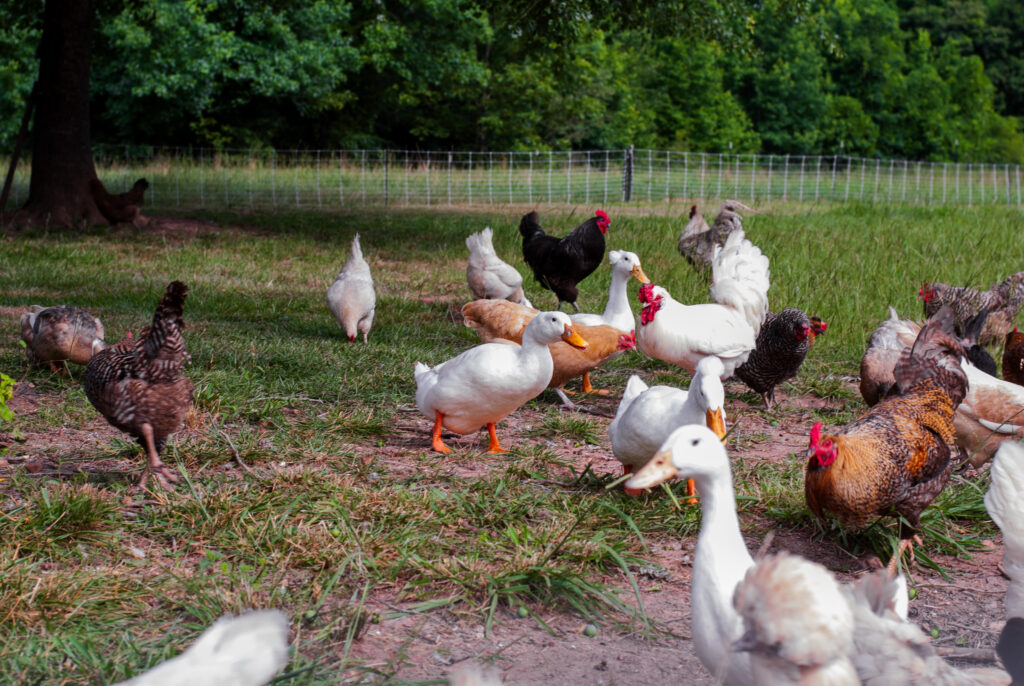
Having a Goose on the Homestead
A goose can be a great addition to a small farm. They’re pretty low maintenance and great at keeping your flock alert for predators. They also lay delicious eggs.
With homestead space and animal housing at a premium you may be wondering can geese and chickens can live together.
Yes, they can! However, you do have to provide them with plenty of space. You also need to consider how to feed and water both animals.
With some careful planning, you can create a great setup where they can live in peaceful coexistence.
Housing
Housing is perhaps the most important consideration you need to make if you want your geese and chickens to live together. Chickens will need a chicken coop that is draft-free and has plenty of floor space.
They also need roosting bars. Chickens don’t like to roost on the ground at night. They prefer to be in the highest area of the coop.
Geese prefer to sleep on the ground. They like fresh straw bedding and will snuggle into a little nest.
Their sleeping habits can cause an issue when they’re sharing the same coop. Chickens produce the most manure at night while they’re sleeping. If your geese nest underneath the chickens they’ll end up sleeping in waste.
It’s best if you have a separate area for your geese to sleep that isn’t under a sleeping flock of chickens.
I accomplish this by letting my goose sleep in the chicken yard. It’s protected and has a separate house for her to use as shelter. That way there’s no chance she’s sleeping in manure.
It’s also important to consider how the goose will get into the coop if it’s raised off the ground. Like ducks, geese aren’t great at climbing. A ramp will be the best way to make sure your goose can easily get in and out of coop.
Check out my article on how to raise chickens and ducks together.
Chicken coop articles you need to read
- How big should a coop be for 20 chickens
- Chicken roosting ladder
- The best bedding for chickens
- Chicken tractor
- How to heat a chicken coop without electricity
- DIY Chicken Coop
Consider the Number of Geese You Want to Raise
The number of geese you have will have an impact on whether or not you’ll be able to safely raise them together. A goose will imprint on his or her flock mates and form a strong bond.
If you have a flock of geese they’re going to stick together. They may even see your chickens as a threat, though this is rare.
Geese can be aggressive and will try to form their own pecking order. It’s important to monitor your flock for signs that everyone isn’t getting along. Raising them together from a young age helps with this behavior.
It also helps if everyone is allowed to free range during the day. That way, both species will have plenty of space.
Having a single goose is beneficial when you’re raising a mixed flock, especially if it’s a female. She will bond with the chicken flock and be very protective of them.
A guard goose is a deterrent for aerial predators. Read more about the best animals to protect chickens from predators.
Also, a male goose can become aggressive towards you. Aggression depends a lot on the way they are raised, but it’s always a real possibility. Be mindful if you’re going to add a gander to your flock.
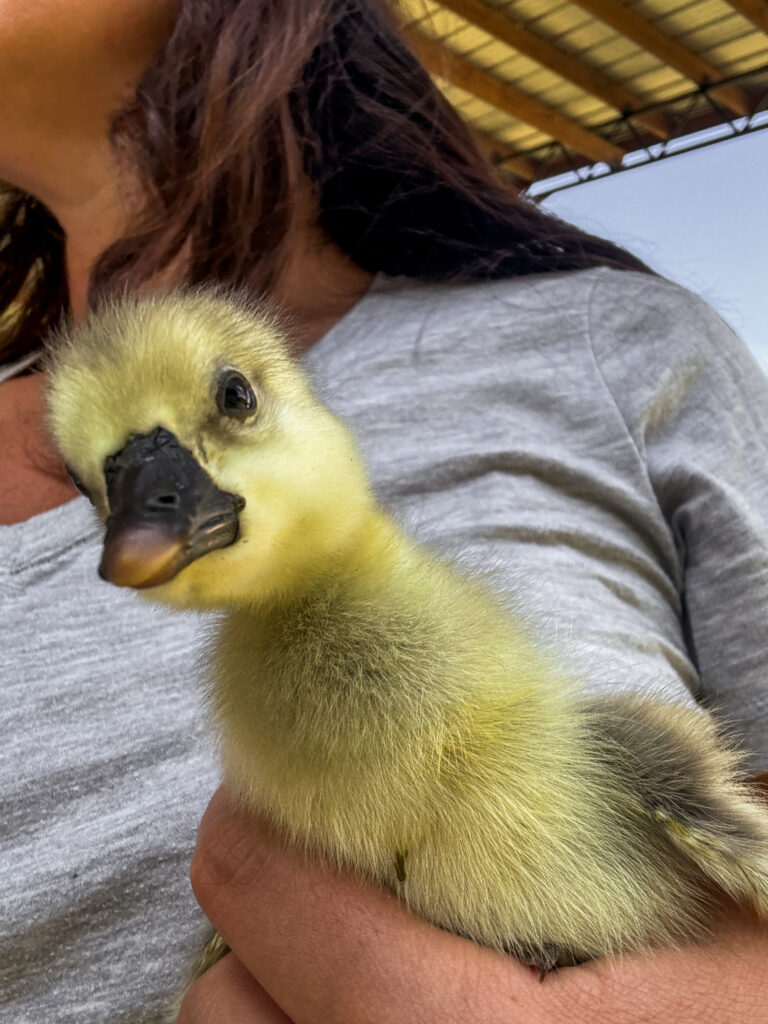
Consider Age and Brooding
The age of the flock you are wanting to raise together will also influence whether or not they’ll get along. Raising the geese and chickens together from a young age will help them to bond better together.
While it is important to introduce young birds together, brooding baby chicks and goslings in the same brooder isn’t a good idea. Goslings can be very messy with their water sources. They’ll create a very wet environment for the chicks.
Extra moisture in the brooder will lead to more illnesses in your chicks. It can also make it difficult to maintain their body temperature and cause other health issues.
Geese will grow a lot faster than chickens and can accidentally injure them.
It’s safer brood your goslings and chicks separately.
It’s possible to introduce adult birds to each other too. If you’re going to integrate your flock, do it slowly. Set up a look-but-don’t-touch system where the birds can see each other, but can’t hurt each other.
Again, I achieve this in my outdoor chicken run. I lock the young birds into the run and keep the older birds out. I have a free ranging flock so this works for me, but there are different barriers you could have in place.
A large dog kennel will also work great for keeping adult birds separated while getting to know each other.
For more information on how to integrate your flock take a look at my previous post on the topic.
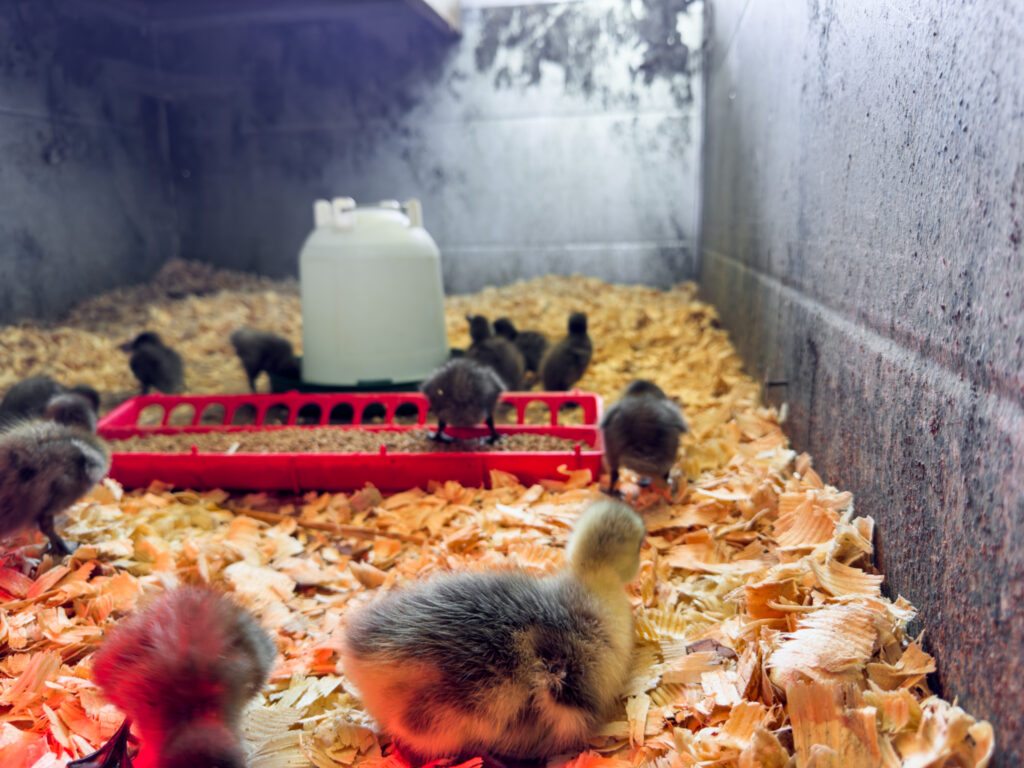
Can Geese and Chickens Live Together? Dietary Needs
Perhaps one of the most critical factors you should consider is the dietary needs of the different species. Geese, like other waterfowl, can eat layer pellets but will require additional niacin. A waterfowl-specific feed is best.
Goslings are prone to developing angel wings, a condition that happens when their nutritional needs aren’t properly met and they grow really fast.
One way to prevent this from happening is to provide them with a starter feed that’s 20% protein for the first 4 weeks only. Afterward, they should be switched to no more than 16% protein.
Geese will also graze well on grass. In fact, grass is one of their main sources of nutrition. Allowing them to graze early will ensure they’re getting the proper nutrition they need.
If you’re raising geese with your chicken flock. Providing them with separate feeding areas is a good idea. Also, the goose may not be able to effectively use certain styles of chicken feeders due to their larger beak.
A more open-style feeder and water bowl on the ground level is a great idea for them.
Waterers
A goose is very similar to a duck in that it needs access to water to keep their nostrils clear and swallow their food without choking.
I have a free ranging flock and leave open waters all around the coop. The geese eat grass during the day and have access to plenty of water.
In the evenings when the chickens go into the coop to sleep, I provide food for my geese in their run area. This helps to ensure that the geese have easy access to their food without the chickens getting in their way.
It’s also a great way to train your geese to go up at night. They don’t naturally go to roost like chickens do. By feeding them in their enclosure in the evenings, they learn to go there and eat without you having to round them up.
Also, it’s good to have a waterer that is specific for chickens around your coop and run as well. Geese are waterfowl and will make a huge mess out of open waterers. I use this style of waterer for my chickens. The geese and ducks can still use it, but they don’t get it as dirty as the open-style waters.
I also love this bulk waterer to supply both species of birds.
Noise level
Geese are known for their loud voices. One reason people like to keep them on the farm is due to their noisy alerts. They’ll be the first to “yell” when there are predators nearby, letting the chickens know to hide.
They’ll also let you know that something up. Not to mention smaller predators are pretty intimated by an adult goose and for good reason. Larger birds like an adult goose can easily overtake a small predator.
While their loud squawks can be seen as a positive, this trait can make it hard when they are house companions. If you live in a neighborhood chances are you may have ordinances in place that will prevent you from keeping a loud farm animal like a goose.
Chickens are also sound sleepers. They even have dreams!
Geese don’t sleep as sound as chickens do. Like ducks, they are unihemispheric sleepers. Meaning they keep one side of their brain alert for predators. They can actually sleep with one eye open.
This means that geese can remain somewhat active during the night and disturb the chickens with their chatter. Both species would benefit from having separate sleeping areas if they’re sharing a coop or yard.
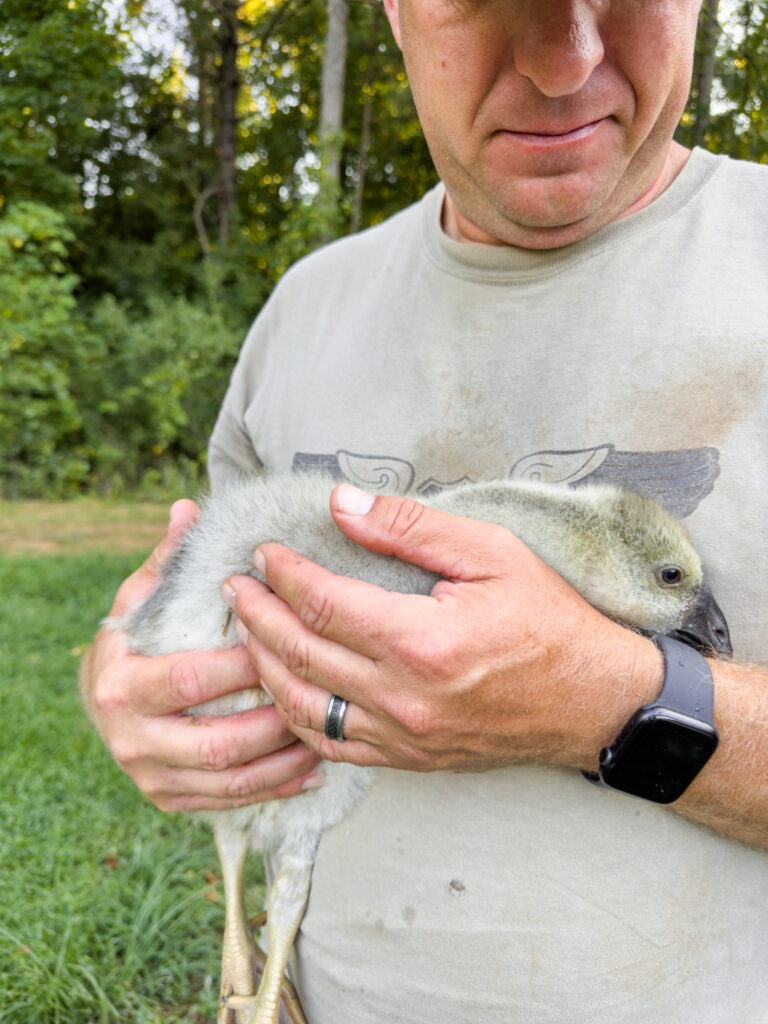
Risks Associated with Raising Geese and Chickens Together
There are certain risks involved when you raise different breeds. One of the biggest risks of raising geese with chickens is a gander.
A gander may try to mate then hens during a certain time of year. Waterfowl have different reproductive systems than chickens and large male birds can injure or even kill a hen.
The same is true if you’re raising ducks with your chickens. A drake can also injure female hens if he tries to mate them.
I have found that having a rooster in the flock does help to protect the hens from a drake. However a male Goose is much bigger than a rooster and could be at the top of the pecking order.
It’s best to keep a gander separate from your flock all together, or to only raise female geese.
Also, allowing your flock to free-range if possible is a great way to give everyone enough space and distance.
Disease
Geese and chickens are both susceptible to many of the same diseases. Avian influenza is a big risk for both species, especially if your farm is on a migratory pathway.
Practicing good biosecurity is the best way to help prevent illnesses in your flock. Also, don’t introduce new birds to your flock until they have gone through a period of quarantine to ensure they don’t bring any diseases with them.
Even after a period of quarantine, they can still carry some dormant disease you may not know about.
Geese are also messy. They tend to create a very wet environment. Viruses and bacteria can thrive in moist environments, which wouldn’t be good for the chicken’s health. It’s also a perfect breeding ground for respiratory illnesses.
Maintaining a clean coop and providing plenty of fresh water is important for both animals to thrive.
Raising Geese with Ducks
Raising geese and ducks together is easy. They have similar needs for housing food and water.
If you’re raising a single goose with your ducks, it’ll often imprint on the ducks. Geese form strong bonds with their flock mates and will be very protective of them.
If you have a gander in your flock, he might try to mate the female ducks. This generally won’t hurt your hens unless there is a significant size difference between your goose and ducks.
Both ducks and geese need access to clean water that they can completely submerge their bills in and clean out their nostrils. They will choke if they can get plenty of water while they’re eating.
While a goose will eat a lot of grass and forage if it’s available, you can feed both species the same food that’s formulated specifically for waterfowl.
They also have similar housing needs. Both geese and ducks will not roost at night and prefer to sleep on the ground. Providing them with ample floor space and nesting materials will keep them cozy and happy.
Also, ensure that the coop is low enough to the ground so both the ducks and geese can easily access it.
FREE Gosling Checklist!
Are you interested in raising geese and need a list of necessary supplies? Check out my FREE CHECKLIST! It has everything you need to get started raising geese or ducks.
Goose Supplies
*This post may contain affiliate links which means I make a small commission at no extra cost to you. Read my full disclosure here.*
If you’re interested in raising geese, you may be wondering what types of supplies you’ll need. Geese are pretty easy to raise and care for. If you’re already raising chickens, you likely won’t need much to get started. Here’s a few must-haves below:
Automatic waterer– This waterer has been so great for my flock here in the deep South. It supplies plenty of fresh cool water for the flock.
Bulk feeder– This feeder holds a good amount of feed and works great for geese, chickens, or ducks.
Stock Tank- While a stock tank isn’t essential, your geese will appreciate having one. They’re waterfowl and love to play in a pool of water. Be sure to add some bricks or stones for them to stand on in the tank.
Coop- Geese will need a safe place to get out of the weather. A coop should be close to the ground, predator-proof, and big enough to house the number of geese you’re raising. It will need to be even bigger if it’s housing both chickens and geese.
Waterfowl feed- Waterfowl need more niacin than chickens do. Providing the with a feed formulated just for them is a good idea.
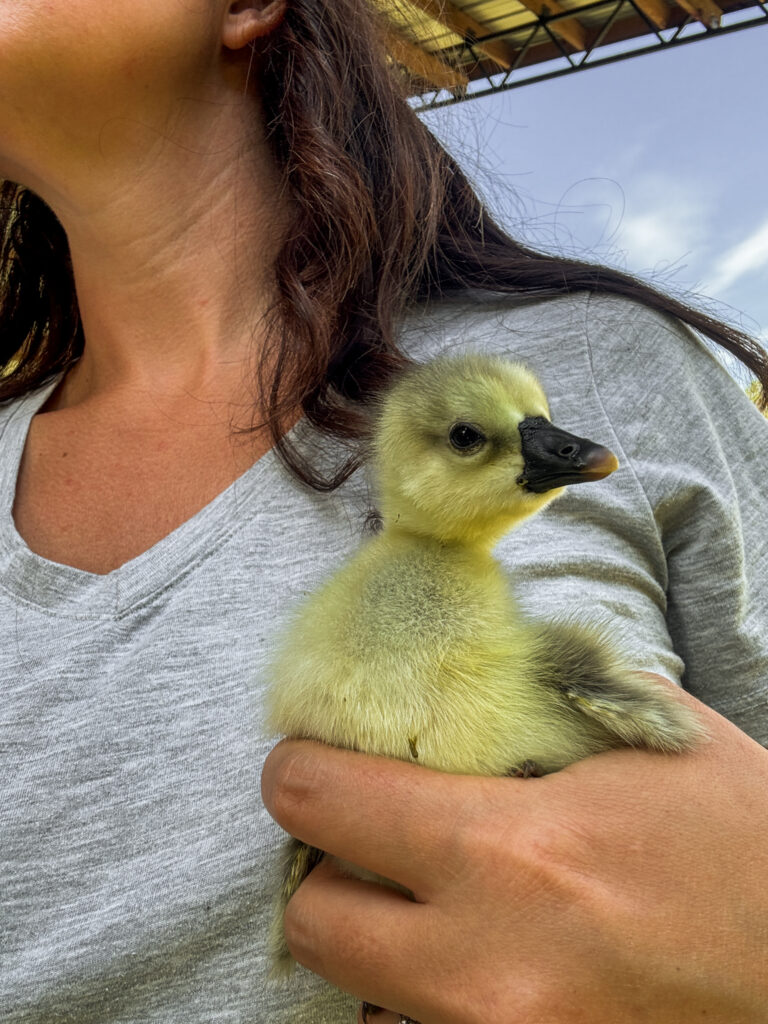
Can Geese and Chickens Live Together-FAQs
Can geese and chickens live in the same coop?
Yes, geese and chickens can share a coop. You just need to make sure there’s enough space for both. Geese are much bigger and need more room. It’s good to have separate sleeping areas because geese like to nest on the ground, while chickens prefer roosting up high.
Do geese and chickens eat the same food?
Not exactly. While both geese and chickens can eat the same basic poultry feed, geese need more fresh greens in their diet. They love to graze on grass, so make sure they have access to pasture if possible. You might want to supplement their diet with extra greens.
Will geese be aggressive toward chickens?
Geese can be territorial and might boss chickens around, especially during breeding season. Usually, they’ll work out their own pecking order. But keep an eye out if the geese get too aggressive or if your chickens seem stressed.
How do I introduce geese to chickens?
Introduce them slowly! Let them see each other from a distance first, then allow supervised time together. Watch for any signs of aggression from either side. It may take a few days or weeks for them to adjust, but patience is key.
Can Geese and Chickens Live Together? Final Thoughts
So can geese and chickens live together? Geese and chickens can share a home happily with a few considerations for both species. You’ll need plenty of floor space and a separate sleeping area if possible. Just make sure the geese aren’t sleeping under the chicken roosts.
They also need separate waterers. Geese need a watering system that allows then to completely submerge their bills. Chickens can use a cup style waterer. Make sure you provide fresh, clean water to both animals.
Geese need access to grass and forage. If you aren’t able to free-range your mixed flock, be sure to provide your geese with grasses.
As always, monitor their behavior and separate them if they become aggressive towards each other.
If you enjoyed this article on geese, please share it!
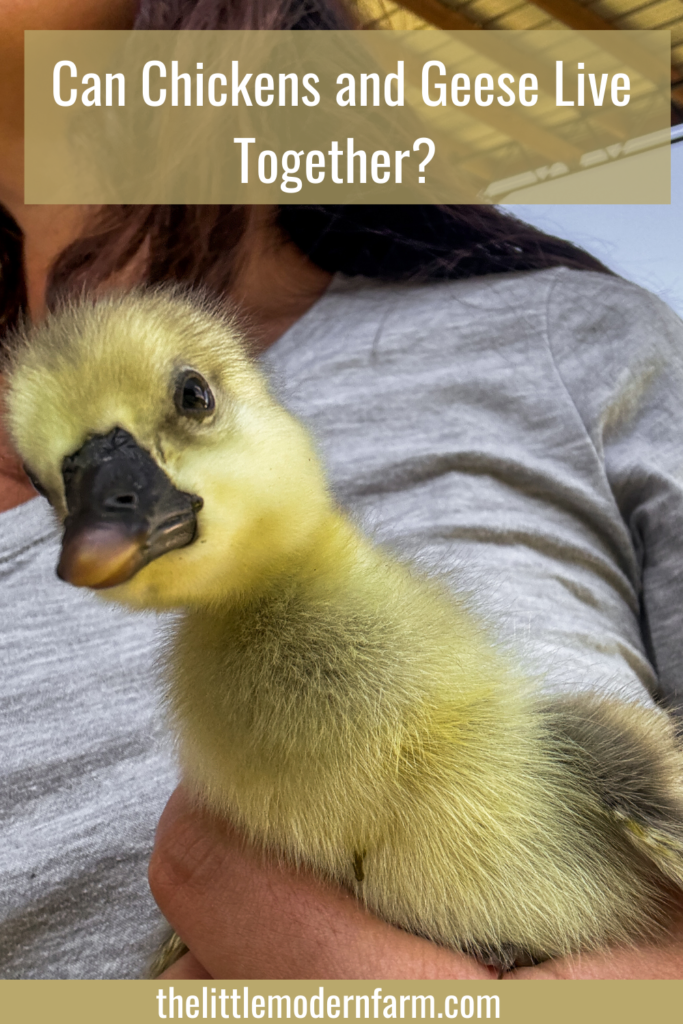
More From the Farm
It doesn’t take long on your journey before you’re wondering how to save money homesteading. After a few months of farming, you’ll soon realize that the simple life can be very expensive. Thankfully there are quite a few ways to save money while living more sustainably. It will just take a little know-how and self-discipline.
Leave a Reply